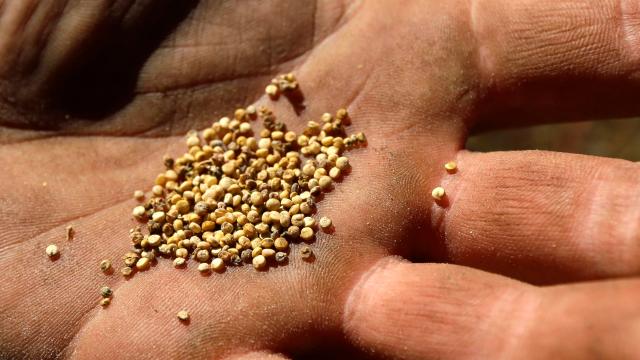Superfoods are garbage. It feels like every time someone realises an under-eaten or foreign food is high in nutrients and gluten-free, be it kale, quinoa or açai berries, marketers slap the “superfood” label on it and suddenly, it’s on grocery store shelves with jacked-up prices, catering to wealthy folks who fall for these kinds of tactics.
Image: AP
Such is quinoa’s plight. The ancient South American grain’s price tripled between 2006 and 2013 following increased interest in the United States, as well as in Australia, though the price has since begun declining. And yes, not only did the price jump benefit South American growers, but quinoa does have lots of nutrients, like proteins, minerals and so on. People should be eating it. It just shouldn’t be a grain reserved primarily for those who buy into healthy living marketing schemes.
That’s why an international team of scientists sequenced the quinoa genome — so that more people can eat it affordably. The grain hasn’t been the focus of many plant-breeding programs, the researchers say, but with the genetic information now available, scientists hope to improve the crop so more folks have access to it.
First, the scientists used advanced laboratory machinery to determine the order of the individual letters that make up quinoa’s genetic code. They then analysed and annotated the code to determine which genes do what, creating a reference for other scientists, plant breeders and engineers to refer to when optimising the plants. The team published the results and made their data available for free in the journal Nature this week.
The scientists’ goal is to offer the fully-sequenced genome to countries where quinoa grows natively like Peru or Bolivia, which might not have the necessary infrastructure to do this sort of analysis and improve quinoa’s genetics, author Joshua Udall, scientist at Brigham Young University, told Popular Science. Other scientists interviewed by Popular Science and the BBC thought the newly sequenced genome was important as well.
The authors list a few ways genetic information like this can be used to grow better quinoa, including to breed shorter, hardier plants with increased heat and stress tolerance. Such genetic tinkering could eventually boost yields and create more stable supplies even as climate change makes the growing season more volatile. Their goal is to see more quinoa on farms and on our plates, potentially for a fraction of the price.
I’m immediately reminded of the way first-world reliance on certain crops can cause problems elsewhere in the world. Take palm oil, for example. The United States and Europe import a whole lot of it, and now we have a biodiversity loss problem on our hands. One can only hope growers and scientists will tread carefully before trying to turbocharge the quinoa industry in other countries, and find ways of doing so that benefit the environment and people growing the crop.
That being said, democratise quinoa! Good grains for all! Stop calling healthy things “superfoods”!
